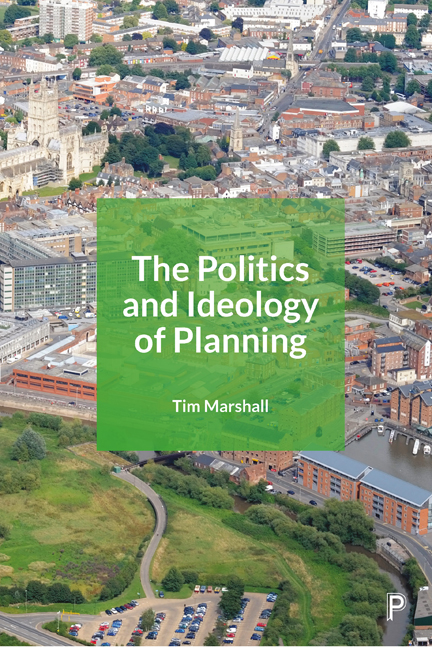Book contents
- Frontmatter
- Contents
- List of figures and tables
- List of abbreviations
- Acknowledgements
- 1 Introducing planning, politics and ideology
- 2 Writing on politics and ideology in planning
- 3 Ideologies in Britain, with initial linking to planning
- 4 Planning history, planning reform and politics and ideology
- 5 Planning expertise and planning law: autonomy from politics and ideology?
- 6 Ideology and politics in government, central and local
- 7 Ideology and politics in professions, lobbying, consultancies and pressure groups
- 8 Communication, the media and deliberation
- 9 Facets of planning action: heritage, local environment and design
- 10 Fields of planning action: housing, economy and infrastructure
- 11 Paths to improving the ideological and political dimensions of planning
- References
- Index
4 - Planning history, planning reform and politics and ideology
Published online by Cambridge University Press: 05 January 2022
- Frontmatter
- Contents
- List of figures and tables
- List of abbreviations
- Acknowledgements
- 1 Introducing planning, politics and ideology
- 2 Writing on politics and ideology in planning
- 3 Ideologies in Britain, with initial linking to planning
- 4 Planning history, planning reform and politics and ideology
- 5 Planning expertise and planning law: autonomy from politics and ideology?
- 6 Ideology and politics in government, central and local
- 7 Ideology and politics in professions, lobbying, consultancies and pressure groups
- 8 Communication, the media and deliberation
- 9 Facets of planning action: heritage, local environment and design
- 10 Fields of planning action: housing, economy and infrastructure
- 11 Paths to improving the ideological and political dimensions of planning
- References
- Index
Summary
This chapter starts with a brief history of the relationship between the long-term transformations of planning and politics and ideology. This is followed by an equally brief examination of the top-steering of planning in one case example, the 2010–15 government. At this very important national level, we can get some sense of how ideological and political dimensions worked together.
UK planning history and ideology
Historians have taken a strong interest recently in the role of ideas and of ideologies (Blackburn 2017). Since at least the 1990s historians of Britain in particular have explored more complex accounts of the role of ideas, especially for the 20th century. Such accounts benefit from looking at ideologies and their mixes and ebbs and flows more carefully than in the past, and with less stress on unmediated ‘material’ forces. Blackburn's survey in fact takes its cue from an article by Freeden (1990) on the absence of serious consideration of ideology by historians. It cannot be said that planning history has always been very aware of ideological elements in what it is studying, but these have been present to a degree. What follows is a very preliminary overview.
We can divide the history of planning for present purposes into three large blocks, one very briefly on the pre formal planning period, one on the movement to the 1947 Act system and the third covering the life of that system and its many ups and downs. The reader must use a real planning history book (such as Ward 2004) to get more than the very bare frame presented here. A further point which is played down here is the significant element of international learning and borrowing, throughout the periods, meaning that the play between ideology and planning thinking should really have this international dimension built in as well.
Before 1914
The ‘prehistory’ of planning in the 19th century saw decisions on land and development oscillating around the relative sanctity of property rights and the struggles within corporations and central government over how far those rights might be ‘infringed’ by one kind of public intervention or another. Put like that, the integral role of ideology in the broad development of these discussions and the political struggles drawing on them is clear enough.
- Type
- Chapter
- Information
- The Politics and Ideology of Planning , pp. 63 - 80Publisher: Bristol University PressPrint publication year: 2020



